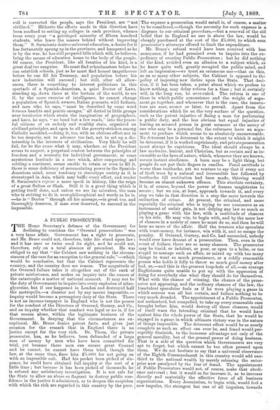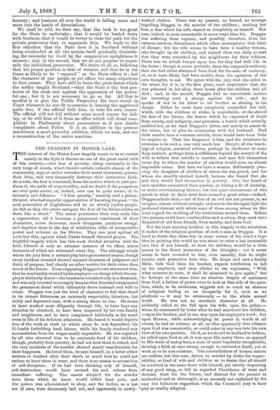A PUBLIC PROSECUTOR.
THE Home Secretary's defence of the Government for declining to continue the "Overend prosecutions" was a very lame affair. Government has a right to prosecute, and Mr. Bruce could not, therefore, take his stand upon law ; and it has once or twice used its right, and he could not, therefore, rely on a total absence of precedent. He was obliged to say that "the Cabinet saw nothing in the circum- stances of the case for an exception to the general rule,"—which would be conclusive, but that the Cabinet represents the country, and the country does see reason. The magnitude of the Overend failure takes it altogether out of the rank of private misfortunes, and makes an inquiry into the causes of the catastrophe a matter of national moment. It may not be the duty of Government to inquire into every explosion of nitro- glycerine, but if one happened in London and destroyed half the metropolis,—a disaster not by any means impossible,— inquiry would become a peremptory duty of the State. There is not an income-taxpayer in England who is not the poorer for the conduct of the Directors of Overend, Gurney, and Co., and an inquiry whether that conduct was legal or no is, if for that reason alone, within the legitimate business of the Government. In denying that the circumstances are ex- ceptional, Mr. Bruce denies patent facts, and gives just occasion for the remark that in England there is no justice except for the very rich. Dr. Thom, the private prosecutor, has, as he believes, been defrauded of a large sum of money by men who have been committed for trial, yet because those men can secure great Counsel and he cannot, he cannot have them tried, though the law, at the same time, fines him £5,000 for not going on with an impossible suit. Had his pocket been picked of six- pence, he could have obtained full inquiry at the cost of a little time ; but because it has been picked of thousands, he is refused any satisfactory investigation. It is not safe for the State to allow an abuse so flagrant to destroy public con- fidence in the justice it administers, or to deepen the suspicion with which the rich are regarded in this country by the poor.
The expense a prosecution would entail is, of course, a matter to be considered,—though the necessity for such expense is a disgrace to our criminal procedure,—but a renewal of the old belief that in England no one is above the law, would be cheaply purchased at the cost of the £5,000, to which sum prosecutor's attorneys offered to limit the expenditure. Mr. Bruce's refusal would have been received with less annoyance, if he had promised even to inquire into the ex- pediency of creating Public Prosecutors ; but he did nothing of the kind, avoided even an allusion to a subject which, as he knew quite well, greatly occupied the public mind, and left an impression—we trust an erroneous one—that on this, as on so many other subjects, the Cabinet is opposed to the policy of imposing new duties upon the State. That deci- sion, if it has been taken, a point about which we profess to know nothing, may delay reform for a time ; but it certainly will, in the long run, be over-ruled. The reform is one of those in which public convenience and the weight of argu- ment go together, and whenever that is the case, the innova- tors are sure, sooner or later, to prevail. Apart from the considerations which lie on the very surface of the question, such as the patent injustice of fining a man for performing a public duty, and the less obvious but equal injustice of leaving an accused person in great measure at the mercy of one who may be a personal foe, the reformers have an argu- ment to produce which seems to us absolutely unanswerable. No deterrent law is deterrent to the extent to which it might be deterrent, if it is worked capriciously, and private prosecution must always be capricious. The ideal should always be a law moderate, lenient, and Christian, but as certain and as in- exorable as the laws of nature, which, whenever they are known, secure instant obedience. A burn may be a light thing, but people do not put their fingers in candles. Penal servitude is worse than toothache, yet we venture to say that if every act of theft were by a natural and irreversible law followed by toothache till restitution had been made, thieving would become an almost unknown offence. This absolute certainty, it is, of course, beyond the power of human magistrates to secure ; but we can, at least, approach towards it, and every step we take in that direction is a step the more towards the extinction of crime. At present, the criminal, and more especially the criminal who is trying to use commerce as an instrument of unfair gain, is not defying any law so much as playing a game with the law, with a multitude of chances on his side. He may win, to begin with, and by the mere law of chances in a moiety of cases he must do so, and then he will hear no more of the affair. Half the trustees who speculate with trust-money, for instance, win with it, and so escape the penalty. If Overend, Gurney, and Co. had succeeded, nobody would ever have dreamt of a prosecution. Then, even in the event of failure, there are so many chances. The prosecutor may be timid, or indolent, or poor, or open to a bribe, or too stupid to manage such an affair, or mixed up with too many things to want so much prominence, or a coldly reasonable person who holds it folly to throw so much good money after bad, or,—and this is the greatest loop-hole of all,—an average Englishman quite unable to put up with the oppression of doing for everybody else what they should do for themselves. What with the chance of winning, the chance of the prose- cutor not appearing, and the ordinary chances of the law, the fraudulent speculator feels as if he were playing a game in which success was all but certain, and failure nothing to be very much dreaded. The appointment of a Public Prosecutor, not authorized, but compelled, to take up every reasonable case brought before him, would destroy all these chances, would of itself warn the intending criminal that he would have against him the whole power of the State, that he would be engaged in a game in which ultimate victory was in the nature of things impossible. The deterrent effect would be as nearly complete as such an effect can ever be, and fraud would per- ceptibly diminish, to the immense advantage not only of the general morality, but of the general power of doing business. That is a side of the question which Governments are very apt to forget, but which cannot be too often pressed upon them. We do not hesitate to say that a universal observance of the Eighth Commandment in this country would add one- third to the national wealth by merely releasing the enter- prise now paralyzed by the fear of fraud. The appointment of Public Prosecutors would not, of course, make that obedi- ence universal ; but it would so far increase it, as to increase directly and materially the effective force of all business organizations. Every Association, to begin with, would feel a new impulse, the strongest but one of all impulses, towards honesty ; and business all over the world is falling more and more into the hands of Associations.
We shall be told, we dare say, that the task is too great for the State to undertake ; that it would be loaded down with business, that it would be better to clear the path for the private prosecutor than to supersede him. We reply to the first objection that the State does it in Scotland without being overloaded at all, the system itself gradually diminish- ing the necessity for itself by the comparative uprightness it ensures ; and, to the second, that we do not propose to super- sede the individual prosecutor. We desire to do so, believing that his proper position is that of witness, and that he is ten times as likely to be " squared " as the State officer is ; but the character of our people as yet offers too many objections to that course. They have still to learn the great lesson which the nobles taught Scotland,—that the State is the best pro- tector of the weak unit against the oppression of the power- ful one ; but it is not necessary to go so far. All that is needful is to give the Public Prosecutor his locus standi in Court whenever he sees fit to exercise it, leaving the aggrieved quite free, if the official fails him, to take his own course. The official will not fail without some sound reason for fail- ing, or he will hear of it from an office which will dread com- plaints in Parliament about prosecutors as it now dreads complaints about Police. It is an addition to the present machinery, a most powerful addition, which we seek, and not a reconstruction of the entire machine.































 Previous page
Previous page